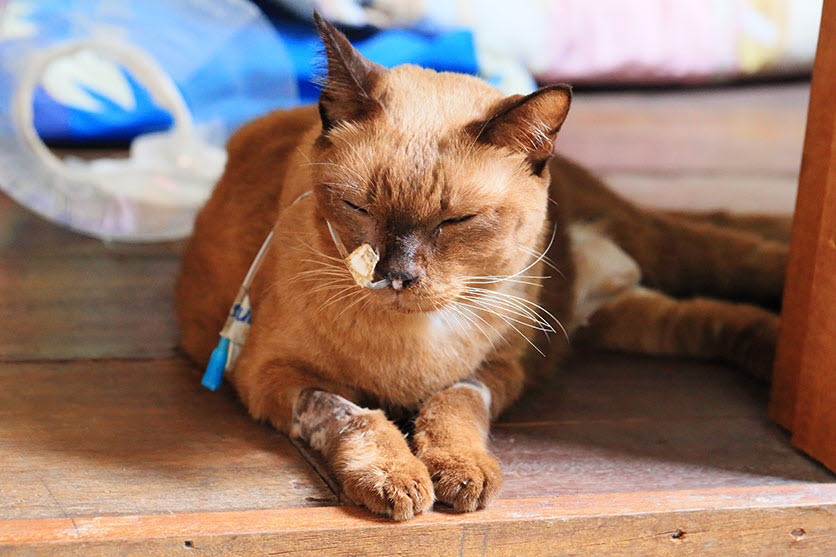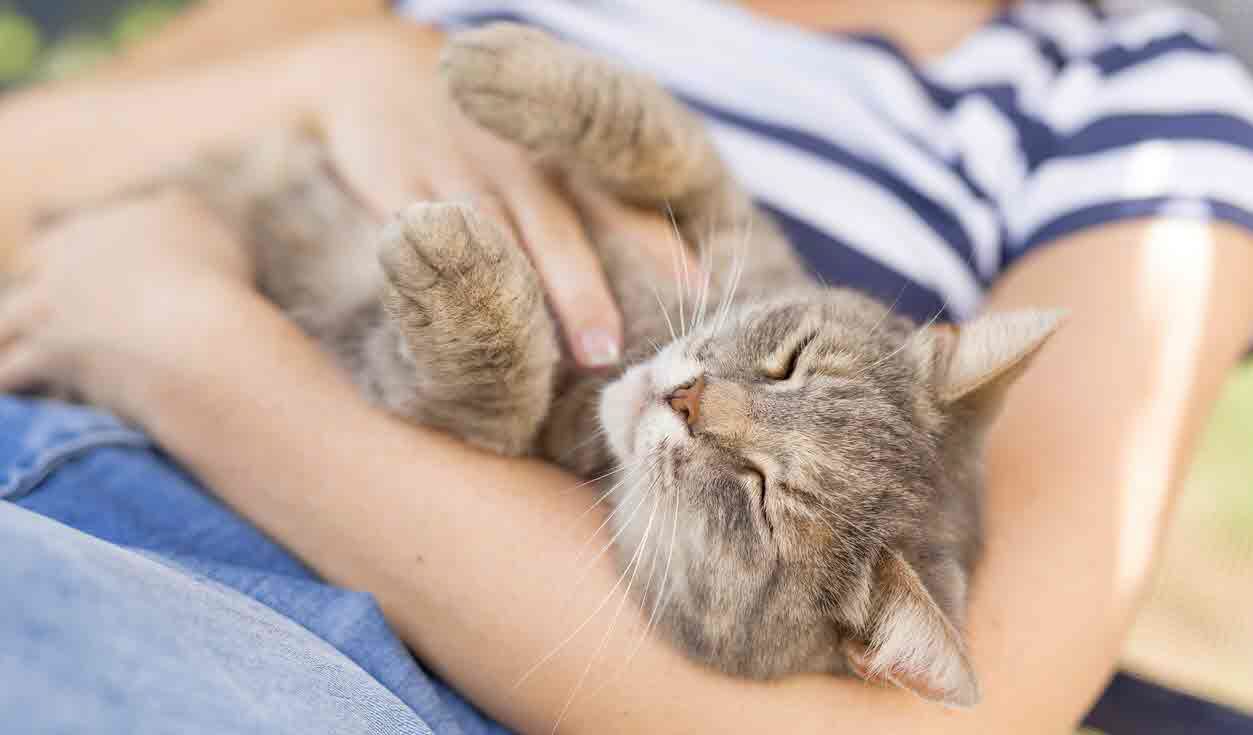
Palliative care for pets may still be an emerging field of veterinary medicine in Australia but get ready to see a lot more of it in the years ahead.
A combination of factors is driving this change. Not only are companion animals living longer and often facing multiple health challenges requiring complex care plans in their senior years, but technological advances and increased specialisation in the industry mean that client expectations around the quality of medical care they want for their pets are also rising.
For this issue of Companion, Heather Vaile talks to Dr Jackie Campbell, one of Australia’s pioneering vets working exclusively in the field of palliative care and in-home euthanasia for pets.
Dr Jackie Campbell is the lead veterinarian of a palliative care and euthanasia service for pets called Sunset Vets. It’s a mobile veterinary service offering a range of compassionate support services for clients who are committed to making the final months and weeks of their pet’s life as comfortable and as pain-free as possible.
The service is offered seven days a week by appointment and the vet visits patients in the privacy of their own home. Around 60 per cent of their patients are dogs and 40 per cent are cats. And while most of the pets they visit are in the later years of their life, they also work with families with young pets who are facing a terminal diagnosis.
Some of the typical diseases they see are cancer, osteoarthritis (in dogs) and chronic kidney disease (in cats) but often it’s the care they deliver to emotional owners that makes the biggest difference. The vets look at factors like pain management and symptom control, nutrition, hygiene, bedding and mobility issues. They also assist with individual care plans, deliver age-appropriate nursing support and help families prepare for what they want at the end.
Because pets at the end-of-life stage often have complicated needs, the vets have long appointment times with clients – usually around an hour – but sometimes longer. As well as assessing the patient, they help owners understand what to expect from their pet’s disease trajectory and can offer oneon- one training and support for those who may need assistance giving medications or a helping hand with bandage and wound care.
The palliative care vet aims to work closely with the pet’s primary care vet and acts to support that vet-client bond. Where appropriate, they also assist with referrals to other health professionals, such as specialists and allied health professionals like animal physiotherapists.
Perhaps one of the most crucial parts of the Sunset Vets service is offering support and guidance for clients trying to work through difficult decisions around quality of life and euthanasia. And when the owner feels that euthanasia is in the best interests of their pet, Sunset Vets will be there too, supporting them every step of the way – before, during and after their loss.
They offer a gentle and private in-home euthanasia service, making sure the pet is comfortable and that their final moments are spent surrounded by familiar faces, spaces and smells. They are also able to help clients with aftercare arrangements and can help pet owners access professional counselling or grief support, as needed.
Dr Jackie Campbell graduated from the University of Queensland in 2006 and developed an early interest in pain management and the management of chronic pain.
“Probably my introduction into palliative care came from treating patients who had pretty advanced osteoarthritis and I certainly recognised that one of the biggest reasons for euthanasia in dogs and cats often came down to mobility issues,” she says.
“I realised that there was so much more that we could and should be doing to manage these patients’ levels of discomfort from a chronic pain perspective.
“So that was the starting point of my interest in working with geriatric patients. We had these really old and rickety patients with advanced osteoarthritis and I actually felt like I wasn’t managing these patients as well as I needed to be – I could see they were in discomfort and felt that I wasn’t doing enough for them.
“And we had clients who were also beginning to expect more, people who would do anything to make their pets comfortable and so I just became more interested in how we can support quality of life and ensure euthanasia happened at the right time.
“I also always used to worry about euthanasing a patient and the client would be clearly distraught and then have to get in their car and drive home. I remember thinking that that maybe there was a better way of approaching that final appointment."
Jackie started delving into models of human palliative care and saw an opportunity to mirror some of those services in the type of veterinary care offered to companion animals. She started her labour of love as a modest small business alongside her clinical work in 2014, but as word spread of her compassionate mobile palliative care service for pets, the business started to grow.
In 2015, she left her work in general practice to focus full time on Sunset Vets and before long, had enough work to ask a colleague to join her. The business has continued to go from strength to strength and now employs 12 vets and two office-based patient care co-ordinators.
Sunset Vets also works with a registered psychologist who is on hand to help clients as needed – face to face, over the phone or even via Skype.
Jackie sees the services they offer more as an opportunity than a threat to other veterinary businesses.
“On the whole we have had nothing but overwhelming support from primary care vets,” she says.
“Most of our clients come to us referred from primary care vet clinics. There are some vets, I think, that have some hesitation about what we do but typically it’s because they aren’t really sure about how we fit in to the health care model.
“One of the things that’s really important if we’re trying to advance more palliative care services in Australia is that clients understand that we’re an adjunctive service and not a replacement for regular veterinary care.
“So our vets don’t do preventative care such as vaccinations or routine diagnostic work. If a patient needs say, bloodwork, an x-ray, or if it needs hospitalisation, our vets will refer that patient back into their regular vet. We’re very much working closely with regular vets in terms of making a care plan.
“The clinics that work really well with us are the referring vets that find it difficult to provide home-based care and we can step in and support them.
“Palliative care is very much about developing an individualised patient care plan where we are prioritising decision-making around what is the most critical thing we look to manage from a quality of life perspective,” she adds.
“The goal posts for care are slightly different to what they are in general medicine. We’re really looking at what are we doing to achieve more comfort for this patient. So sometimes it’s not about ‘Can we fix this problem with this treatment option?’ It’s about ‘How is our patient feeling and what can we do to make their quality of life better?’
“One of the things that is very clear from the human health model is that to deliver palliative care well you need to allow yourself sufficient time, something which can be hard to for GP vets to achieve within the confines of a busy clinic or hospital environment. And particularly for pets at the end-of-life stage, it’s very unpredictable.
“One of the benefits of offering home-based care is that we have more time – typically our consultations are an hour to an hour-and-ahalf – but it really varies per patient. Most of our team are seeing a maximum of three to four clients a day. It’s a different level of care.”
Many of Sunset Vets’ practitioners still work part-time in clinical settings but choose to work in the palliative care space as well because they have seen the need for it firsthand and really believe in it.
“Chronic pain is very under-diagnosed in our pets and that’s often where we’re of most benefit,” Jackie says.
“We’ll come in to see a patient and we’re actually recognising symptoms of pain that maybe haven’t been picked up on yet. Partly that’s because we’re actually seeing these patients in their home environment, where they’re really comfortable and we’re looking at their day-to-day behaviours. And particularly with cats, the pain diagnosis is often based on changes in their behaviour, as opposed to obvious lameness or vocalisation as it can be in dogs. So we won’t see that in the hospital environment. They go in for their check-up and that pain won’t be as obvious to the GP vet there as it is when the pet is in their home environment.”
When asked why more vet practices don’t offer palliative care services for pets, Jackie says that partly it’s because there’s not enough education out there about how to deliver it.
“It’s also about rewriting the conversation around death, and for me, death is not the failure point. What is more of a failure is if we haven’t achieved quality of care up until that point and taken steps to make sure that that death is timed well and is peaceful.”
She adds that while she recognises that euthanasia discussions in a busy vet clinic can be difficult on everybody, how and when vets talk to their clients about this option can also be particularly traumatic for clients if not handled right.
“One of the things we hear a lot from clients that they’re told ‘You’ll know when it’s time.’ Vets will often comment to their clients that ‘This is a terminal diagnosis, here’s the plan and you’ll know when it’s time. Come back and see us when it’s time.’ And I think that is really challenging for clients because the reality is that you very rarely know exactly when it’s time.
“And from the client’s perspective, they may need more logistical support from their veterinary teams than that.
“So that’s where there potentially needs to be a palliative care discussion around, ‘What are we expecting from this?’”
The flipside of this is when the primary care vet feels that it’s time to euthanase a pet but for whatever reason, the pet owner disagrees.
“A lot of the time we’re seeing families who are not able to make those decisions yet and sometimes they’ve actually stopped going to their vet because their vet is saying ‘It’s time’ and inadvertently making them feel uncomfortable because they’re just not ready for euthanasia yet,” she says.
“Often there’s a mismatch between the vet’s perspective and the client’s perspective, and at the end of the day, if we don’t communicate with our clients on the same level and work with where their head space is at, it’s always the patient that suffers.
“We need to get better as an industry at engaging with our clients. Our whole philosophy is about non-judgement and just gently leading our clients towards the decisions that are going to be best for their pet.”
Significantly, the Sunset Vets team are also there for their clients after the death of a beloved pet.
Jackie says “People who are well prepared before the passing of their pet have less complicated grief following it.
“We see some cases of what’s called ‘complicated grief’ which is grief that can persist or recur, anything up to multiple years following the actual loss or the passing of the pet. So we try to help people to work through their grief in a much healthier fashion.
“A huge part of our business is that ongoing support if needed. So people know they can get back in touch if needed, there’s always follow up, we keep in touch anything up to 12 months following the loss of a pet. We’ll be checking back in with them 12 months later and just saying, ‘How are you going? Is everything OK?’
“So I guess it’s creating a new standard of care for client care around death and dying and that’s really what we’re trying to establish around having a discussion about palliative care in the veterinary industry.”
She goes on to mention an exciting collaboration Sunset Vets is working on with The University of Queensland’s psychology clinic:
“The psych clinic works a little bit like the vet clinics that are attached to most of the vet schools around the country, so it’s an operational clinic but essentially run by provisional psychologists in their first year of practice.
“We’ve developed a wonderful partnership that allows us to offer clients subsidised counselling sessions. So if we have a client that is incredibly distressed and can’t access professional psychology support for financial reasons, we can refer those clients to the university for support.”
Other companion animal vets are also encouraged to access this service for any of their own clients they may be worried about, and simply need to contact Sunset Vets for a referral.
While you could be forgiven for thinking Jackie’s work must be really depressing, she says this is absolutely not the case.
“I love everything about my job. We work with the BEST clients and it’s very professionally rewarding. I like working with complicated cases, I like seeing patients that maybe haven’t had their pain recognised or diagnosed and we can implement some treatment and then they do really well.
“It’s also really exciting space to work in because it’s new.
“We see a lot of sadness but we also see a lot of joy. I think that’s one of the things that people don’t appreciate is that even in those moments of sadness, there’s a lot to focus on that’s really positive. And overwhelmingly, all of our vets find this work so rewarding. We’re working with clients who really love their pets and we’re helping them to ensure that we’re maximising quality of life.
“So we don’t approach it as a job that’s overtly sad. I think a lot of people in the veterinary industry talk about getting compassion fatigue with this kind of work but for me, compassion fatigue is more related to seeing something that you want to influence the outcome of but you haven’t got the capacity to do so. Maybe you have a client who has a young pet with a broken leg but they can’t afford treatment or they don’t want to implement treatment that you feel would benefit that patient.
“Whereas we do have capacity, we’re working with very willing clients and you can’t ever run out of compassion if you’ve got capacity to make that pet’s life better and that death better. The owners we work with want to do everything that they can and we’re just looking out for that patient’s welfare.”
The future is certainly looking bright for Sunset Vets and Jackie explains that their vision is “to have vets working with us right across the country, supported by our incredible patient care team in the office.”
She hopes more vets will start to see the very real benefits of offering enhanced palliative care options for patients and better client support for pet owners.
“We’re certainly looking for more vets who want to learn from what our current team are doing,” she says. “We’re trying to expand not just what we do but also help other vets to integrate palliative care into their practices. It can absolutely be done in general practice too and there’s a big need for it, that’s for sure.”
This article originally appeared in the AVA Australian Small Animal Veterinarians Group Companion Magazine, Q4 2018


